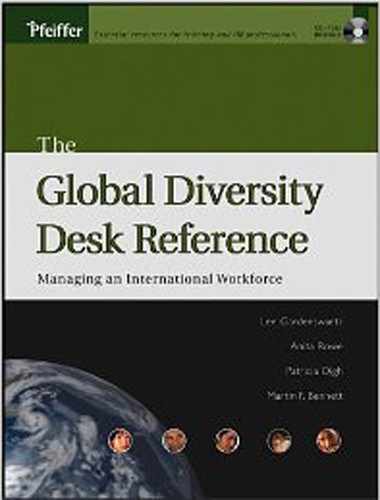7.6. COMPENSATION AND REWARDS
An inclusive organization demands a global compensation system that reflects worldwide equity for employees and travels well. Without easy explanations for and execution of the wide variables in base pay, merit pay, incentives, and cost-of-living adjustments, inequities will be thought to exist, weakening the company's potential for remaining globally inclusive. Questions such as: "Why does the expatriate Japanese plant manager in Tennessee rent an upscale home and send his kids to private school, when the duel salaries of my husband and me barely meet our needs?" can easily come up and must be answered.
An inclusive compensation system enhances a company's ability to position itself with competitors, transfer employees across borders, maintain a diverse group of strategic leaders, recognize individual contributors, and build morale.
Traditional expatriate administration provides indicators as to what a worldwide system might look like. Ideally, it includes one global policy that uses a companywide base pay, with adjustments for the local national competitive standards of similar industries. To that figure, national adjustments can be added that correct the cost-of-living variances due to the economic and social environments of nations, as well as all national compliance issues, such as social security, government health programs, workers' compensation, and so forth.
While these calculations are straightforward and formulaic, the components that relate to motivation and performance are influenced by national culture. They also allow for the greatest abuse due to favoritism, nepotism, and forms of corruption. If we are going to pay for merit, what constitutes merit? What cultural standard of merit do we use? Is it the completion of the job to the specification of the job analysis—that is, staying in the box—or the demonstration of skills and outcomes that exceed expectations? Is a lump sum dollar award more motivating to the Argentinean plant manager or would she rather receive a level advancement with incrementally increased compensation? Cultural analysis is needed to create the best system. One size does not fit all, and the imposition of headquarters' cultural model is not the most effective way to demonstrate diversity. Attention must be given to the worldwide use of stock options, restricted stock grants, stock appreciation rights, phantom stock, and cash incentives, as well as cooperative saving plans that would provide educational endowments for children or home ownership. These tools are well-accepted in many developed nations, but mechanisms have not been established to create equity among worldwide employees. Without this equity, the perception of discrimination will undercut the gains in workplace inclusion.
